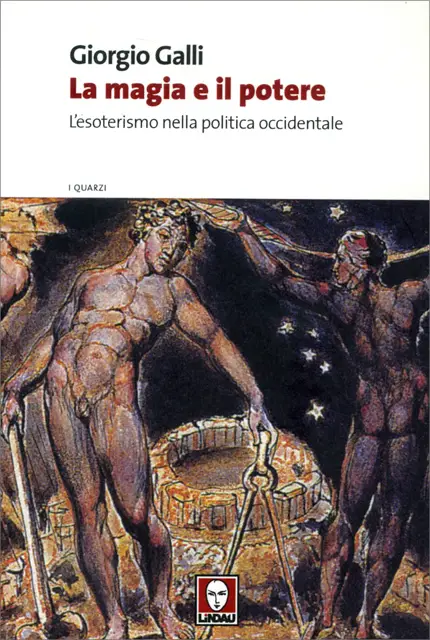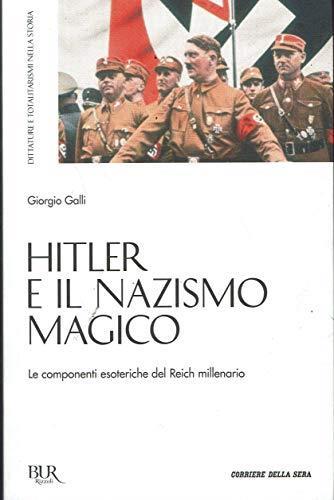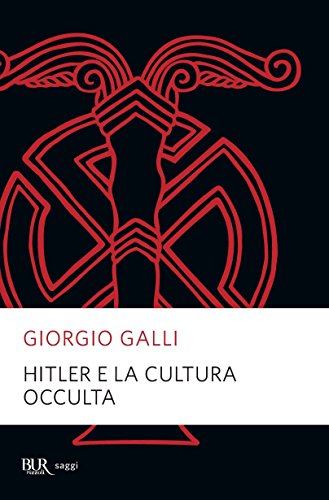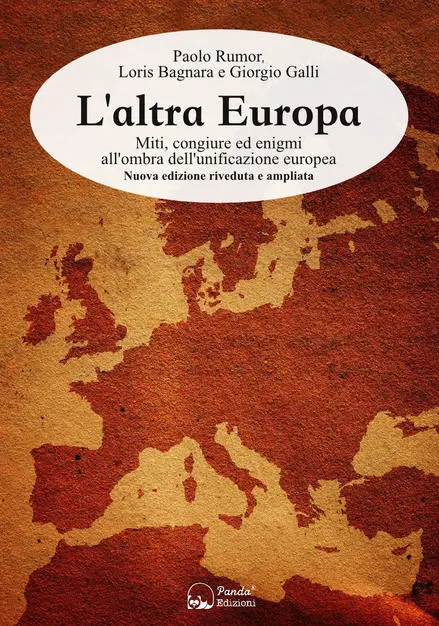In memory of prof. Giorgio Galli - Milanese political scientist, historian and academic who passed away on December 27 at the age of 92 - we are republishing this interview given to the magazine «Antarès» a few years ago.
di Andrea Scarabelli
Interview originally published on Antares N. 5/2013 «Occult modernity - The symbolic roots of contemporary arts» and on the website of Bietti Editions.
& Rita Catania Brown
How do you interpret the return of interest in esoteric themes in the heart of the post-Enlightenment and positivist era?
I believe that an answer can only be given in terms of probability. I think what we define esotericism both a deposit of ancient cultures that have perceived, albeit in a confused way, a way of relating with reality that had elements of validity, which were completely set aside by the scientific revolution but which are probably inherent, so to speak, in a particular way of human nature to approach reality. This does not mean that the approach of the scientific revolution, with the great results it has given, is not valid. But there are probably ways of interpreting reality that are irreducible to those of science (based on the experiment, on the verification and repeatability of the experiment), other paradigms, in short, with respect to the positive one. Just think of the role of myths and legends and the weight they had in the evolution of man. My interpretation is that these ways are so strong and ingrained that they are able to withstand the first wave of science - when it tried to explain everything, thus overwhelming the "esoteric" approaches. Gradually this wave has diminished in intensity (just think of the omission, in today's science, of the omnipotence of positivism, with the effect that scientists themselves are well aware of their limits). Well, after the crisis of seventeenth-century confidence, which culminated in the eighteenth-century Enlightenment, this modus operandi defined as esoteric, a fundamental component of the human being - even with its charge of naivety and approximation, of course - it tends to re-emerge. I believe this is a possible explanation.
Which implies that the modern sciences are not the natural evolution of the traditional esoteric sciences ...
Exactly. They are entirely different points of view. For example, alchemy is not an earlier, "naive" stage of chemistry. Likewise, astrology is not the infant stage of astronomy. They are not "protosciences", but disciplines that are very different from each other.
Anyway, has something been lost?
During the first wave of optimism of a science that claims to explain everything in an exhaustive manner, a different way of dealing with reality, re-emerged following the crisis of scientific "certainties", has failed. This is a hypothetical explanation - otherwise one would fall into contradiction. For example, it would not be possible to explain why the great leap forward of quantum physics took place in Germany between the end of the nineteenth century and the beginning of the twentieth century, in that same Germany in which the astrological rebirth was particularly lively and in which the flourishing of those esoteric approaches that will later develop, moreover, in National Socialism. Many of the scientists involved in atomic energy - whose research led to the supposition that Germany could have the atomic bomb even before the United States - believed in the validity of astrology. Well, precisely in this same period it would seem contradictory to witness, on the one hand, the great scientific development, on the other, the re-emergence of these other cultures. If we think precisely of an alchemy that prepares chemistry or an astrology that announces astronomy, how can we explain this return of interest? They are irreducible approaches to a common denominator, both very strong, which periodically re-emerge, often following the crisis of the other paradigm.
This is equivalent to giving up Comte's positivist approach, which instead puts these disciplines on the same evolutionary scale. On the other hand, it remains true that, if in the premodern era a scientist could deal with esoteric disciplines, with the advent of modernity and the specialization of knowledge they become incompatible. Is it not perhaps also for this reason that such a hiatus occurs, for which the traditional approach returns periodically, in a karstic way, on the sidelines of the development of the so-called modern disciplines?
Perhaps it is precisely for this reason that even the interests in astrology or other similar disciplines on the part of scientists such as Newton and Galileo tend to be denied or otherwise reduced by scientific common sense (it is said, for example, that Galileo dealt with astrology just to earn some money). Well, this is certainly the index of a compatibility that has been lost. Which does not mean that they are very different paths: if Galileo had deepened the discourse of astrology, as Pauli tried to do, for example, together with Jung, he would have reached very different results.

Let us now enter one of the topics to which you have dedicated many of your studies. Following these constant interferences, how is the relationship between politics, culture and esotericism taking shape?
These are rather occasional relationships - I have insisted on this several times. Throughout the history of mankind up to the scientific revolution, the practitioners of this other approach, of this other discipline - were it the seers, the Roman wishes, the prophets of Israel or the astrologers and alchemists who were part of the normal staff of power - were fully integrated into the political sphere. This continuity and normality then disappeared: the relationships became occasional. I don't think we can give a global explanation of their persistence: they happen in certain places, for certain circumstances, around certain personalities or strands of thought. They are also very varied. What I try to observe is that the connection between politics and esoteric sciences does not only concern, as has often been said, the relationship between the culture of the Right and the esoteric, but that elements of this type are found throughout the political thought of modernity. I have examined with particular attention the liberalism, apparently the most rational of all, within which it is possible to glimpse this atmosphere. Occasionally, of course, as already mentioned - this relationship is certainly not usual. It was normal once, when wishes and astrologers were asked regularly. Now they are in an exceptional way and limited to certain situations. However, it is true that astrologer Joan Quigley wrote a book called My seven years as a White House astrologer for Nancy and Ronald Reagan (Carol Publishing, New York 1990), for example. As she tells herself, she began working at the White House not as an astrologer but to improve the image of Nancy Reagan, considered not up to being the First Lady. Well, as I wrote in Esotericism and politics (Rubbettino, Soveria Mannelli 2010), according to what this astrologer tells and is later confirmed by members of the White House, Reagan consulted this lady, having horoscopes made, before meeting Gorbachev. Of course, it is an occasional circumstance, but it testifies to the fact that this cultural trend has continued to exist in the United States. In American culture, Reagan is also reached through the persistence of this approach. Roosevelt's Vice President Henry Wallace also consulted astrologers and believed that astrology was a scientific discipline. However, these are, once again, exceptional situations. By following the way in which these circumstances occur, one can reconstruct biographies of politicians and currents of thought and ideology. I have collected a lot of such material. On the other hand, it is a model of analysis applicable to many other political realities, as we will see: a young scholar, Francesco Dimitri, wrote a book, Magical Communism (Castelvecchi, Rome 2004), and then another on haunted houses. Then he started writing short stories: perhaps he could have continued to investigate this issue. National Socialism, in particular, was the movement in which this phenomenon is most evident. I have collected a lot of material that I am organizing in a book that will be released in May for Rizzoli on the political developments of National Socialism and the presence of esoteric culture within the European one. Returning to the question, the relationships between politics and esotericism, once systematic and continuous, are now only exceptional. What can be done is, from time to time, try to understand how and why it happened there and nowhere else.
Can we say that, if for a Rudolph II or a Catherine of Sweden it was a pride to have alchemists at their court, to have an astrologer at the White House is instead a reason for embarrassment?
Not only. Even Hitler, who had a very specific training in this direction, then tried to completely obliterate these interests of him. In my opinion, in the Mein Kampf (I edited the edition for the types of Kaos in 2002), this formation emerges clearly, although he does everything to hide it, even going so far as to build another process of cultural formation that excludes it. Despite this removal, in the Mein Kampf this path emerges from time to time. It also happens in the case of many personalities in finance. Agnelli, for example, regularly consulted Gustavo Rol.
While the relations between National Socialism and esotericism are now a topic that has become "fashionable", to the point of being the subject of broadcasts - more or less serious - in prime time, the presence of occult themes in political phenomena such as fascism and Bolshevism is less known ...
On the relationship between fascism and occultism, I believe the best study is the one by Gianfranco de Turris, Esotericism and fascism (ed. Mediterranee, Rome 2006). The situation is very different from that of National Socialism since, while Hitler was affected by the influences mentioned above, Mussolini has always been - if we wanted to define him - a positivist Marxist, as regards his cultural formation, with some points of superstition (always speaking of coincidences, however, in 1921, he had a road accident in Dongo). Another useful trace: many of his government were Freemasons - for what little esoteric remained in Freemasonry ... Basically, Mosse was able to describe the cultural precedents of Third Reich because in Germany there was a whole cultural effervescence linked to occultism (see the aforementioned rebirth of astrology). In Italy, perhaps also due to the presence of the Catholic Church, there has not been this revival of interests.

The figure of Dante is also fundamental with respect to the relationship between fascism and esotericism. Many were the studies that developed around the Poet in the years of Mussolini, especially in the circles of esotericism and Roman traditionalism ...
I think of what Dante said, in canto IX of theInferno: "O you, who have healthy intellects, / look at the doctrine, which hides itself / under the veil of strange verses" ...
Reference can also be made to the Convivio, regarding the four ways of interpreting the texts, literal, allegorical, moral and anagogical ...
The same order of considerations, of course. On the other hand, I was very surprised that Franco Cardini, from whom I learned a lot in various fields, believes there are no links between Dante and the Fedeli d'Amore, thus circumscribing the esoteric reading of Comedy.
What about Bolshevism instead?
In Russian culture the esoteric element is much more present than in the Italian Catholic one. Here we find decidedly "strange" phenomena: Lenin's first secretary, for example, can be considered an esotericist. As Luciano Parinetto argues, the use of esoteric figures in Marx's writing is very frequent. Indeed, already from the first bars of The Manifest, which evoke that "specter that roams Europe", but also in the figure of the "sorcerer's apprentice", or even in expressions such as: "In England they stopped burning witches when they began to hang money counterfeiters" . Apart from these distant precedents, we find all that current that reaches up to the "seekers of God", for whom God is the proletariat. Why did all this happen right there, in Marxism? Perhaps, as Dimitri argues in his book that I have already cited, there are analogies between the birth of the so-called "scientific" communism with Marx and the rebirth of esotericism with Éliphas Levi. Dimitri compares these two processes, which proceed in parallel, which would seem to be in opposition but perhaps instead testify to the re-emergence of that ancient culture, whose roots are so deep that it can re-emerge even in the most unexpected moments.
Two forms that, starting from their antithesis, are unavoidable but continue to alternate over the centuries ...
Reference can also be made to the strange relationship between Stalin and Bulgakov.
Stalin wanted to keep the writer in Russia ...
Of course. In 1930 he made a phone call to the author of the Master and Margherita and a scholar of esotericism, who had applied to the government to be able to work as a director or to obtain permission to leave the USSR. He at first thought it was a joke. It seems Stalin had said to him: “We have received his letter. We read it with the companions. You will receive a positive response on this. Or maybe he is serious when he says he wants to go abroad? We just got bored with her, huh? Apply. In my opinion, they will accept. You know, you and I should meet once, talk a little. " Bulgakov thus got the job of director. Stalin, who loved the theater, read the writer's works, seemed enthusiastic about them, but then blocked them, preventing their performance. Stalin had studied in the seminary - perhaps, in his formation, some aspect of Orthodox Christianity (the less rationalist component is more "magical", so to speak, impervious to Platonism and Greek rationalism, as Joseph Ratzinger put it) remained. It is also curious that the speech Stalin gives at Lenin's funeral looks just like a repetition of esoteric formulas adapted to the style of the times. In fact, he says: “Comrade Lenin said that party unity is the most sacred thing that we must protect. We swear to you, Comrade Lenin, that, following your teaching, we will protect the unity of the party ”. Or: “Comrade Lenin told us to be wary of false friends. We swear to you, Comrade Lenin… ”, and so on.
Authentic ceremonial magic!
Really, it looks like ceremonial magic. Perhaps it was the Orthodox heritage that had an impact in this sense. Then we find other aspects, always linked to Orthodox Christianity. In early Bolshevism we find Lunacharsky, the "God-Buildings". There was a whole vein of this type that seems strange enough, with experiments that even seem to recall hermetic operations. All signs of the persistence, in a highly rationalistic environment, of esoteric and occult elements.

Returning instead to the American panorama, in your studies you speak very often of Howard Phillips Lovecraft.
Lovecraft defines himself as a staunch materialist. His famous expression "Cthulhu is nothing but a set of electrons" seems to depict in this sense. However, and I return to my conviction already explained before, it is also through writers like him that those ancient cultures that seemed to be set aside re-emerge. Lovecraft defines himself as an heir to the scientific tradition, a materialist; however, an author who tries to tell what he is telling is obviously influenced by that other type of disciplines already dealt with, as this magazine has already highlighted in the issue dedicated to the American writer (N. 00/2011). Although he himself found it hard to admit these influences, this does not mean that they did not exist. In Horror theory (Edizioni Bietti, Milan 2011) Lovecraft reconnects to ancient peoples who would have lived in Europe before its current inhabitants, thus connecting to the legends about the “little people”, the “Little Folk”. Lovecraft was influenced by cultures of this type, which he tried to coexist with his belonging to the scientific revolution.
Another case of the coexistence of modernity and premodernity, therefore ...
Exactly. Also in this regard, I think a big book that I often quote is very important, The rise of economic individualism by Luigi Ferrari (Vicolo del Pavone, Piacenza 2010). The author specifies that in each of us there is a duplicity: on the one hand we are very sensitive to novelties, on the other we are aware that we carry with us an ancient legacy that manifests itself in some way, even if we are not aware of it. I have just read an essay on which Ferrari is working, in which Franz Kafka is indicated as one of the authors in which the encounter between the birth of the modern and the rediscovery of very ancient legacies is most evident. Lovecraft is therefore another testimony to the persistence of these issues and reflections in the United States. It is an underground wisdom that he draws from, a guiding thread of which he is often not even aware, which does not refer to specific texts or historically established cultural products, an underground vein that continues to flow below the course of history.
Do you think it possible to synthesize or in any case reconcile modern science and traditional knowledge?
More than a reconciliation, I believe we must take note of their coexistence. The scientific apparatus is important and, certainly, a part of reality can be understood and also used and transformed, by pivoting on it; however, there is also another method that can be adopted to deal with the real world, which does not give results as spectacular as the first, but which may exist alongside them. At least, historically it has coexisted. As Shakespeare wrote, “there are many more things in heaven and on earth, Horace, than your philosophy dreams of…”. While the traditional Enlightenment held that these two truths could not be part of the same horizon of knowledge, I believe that today's reflection must consider both. In light of the historical evidence, at least. On the other hand, they are areas that cannot even be reconciled, as they are radically different approaches. But it is their coexistence that we need to look at. They are two of the infinite possible ways of looking at the world, at things. At a time when science seemed so comprehensive, it seemed that any other approach should disappear - and so the advocates of modern individualism still think - but it is precisely starting from the triumph of this paradigm that the other approach, which we call esoteric, does not completely disappear but occurs in exceptional circumstances, according to what has already been said. Yet, from my point of view, we must not aim at the dominance of one over the other but, precisely, at a happy coexistence.
We can thus conclude by returning to Newton, who also dealt with esoteric disciplines, interests scarcely investigated or belittled by today's critics (with important exceptions, however, such as Paolo Rossi and Francis Yates) ...
In fact, as his biographer Michael White also wrote, he was moving in both directions at the same time. He studied and was interested as much in alchemy as in gravitation. Probably, not even he was able to keep together the heterogeneity of these interests (not to forget that he was also general manager of the Mint of England…). Perhaps we are people who have received a complicated inheritance, a very layered and often ambivalent psychobiological heritage. Recognizing his duplicity is perhaps the task that awaits us.


2 comments on “Interview with Giorgio Galli: esotericism, culture & politics"